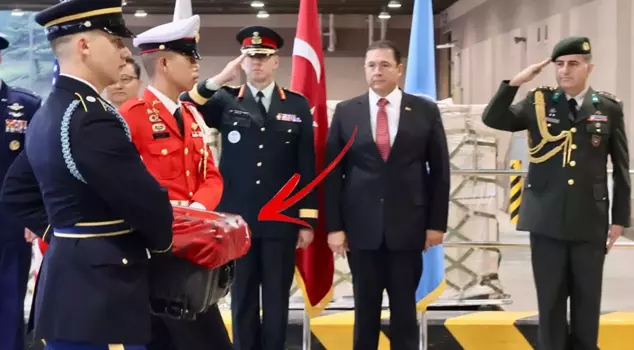
15.08.2025 21:56
In the excavation work in the Kunuri region, where battles on the North Korean side of the Korean War took place and where Turkey suffered the most casualties, a large number of bones and war remnants were found. As a result of the examinations, the remains of four soldiers from the Turkish army were handed over to the authorities.
The Turkish Ambassador to Seoul, Murat Tamer, stated that the remains of 4 Turkish soldiers who were martyred in the Korean War, which began on June 25, 1950, have been recovered and their remains have been handed over to them.
Tamer mentioned that within the framework of the agreement made between the USA and North Korea in 2001, numerous bones and war remnants were found during excavation works in the Kunuri region, where the battles of the Korean War (1950-1953) took place on the North Korean side, and where Turkey suffered the most casualties. He noted that these remains were subjected to examination and consolidation at the scientific center in Hawaii, USA, and that genetic research was conducted.
ONE IS 100% LIKELY TO BE TURKISH
Tamer stated that detailed analyses were conducted on the fabric pieces attached to the bones to determine which army's soldiers, fighting under the United Nations (UN) Command at that time, they might belong to; however, he mentioned that the studies could not be completed due to the COVID-19 pandemic. Tamer reported that in the study conducted at the DPAA Department laboratory of the US Department of Defense in Hawaii, it was determined that one of the assembled skeletons is nearly 100% likely to be Turkish, while the other three skeletons were reported to be of Anatolian origin as a result of genetic and other research.
THE REMAINS WERE HANDED OVER WRAPPED IN THE TURKISH FLAG
Tamer stated that detailed booklets were prepared for each soldier, and within the framework of the coordination established between the (Korean War) Agency for the Recovery and Identification of the Dead under the South Korean Ministry of Defense (MAKRI) and the Military Attaché of the Turkish Embassy in Seoul, the bones of the 4 martyrs were brought from the US base in Hawaii to the Osan US Military Base in South Korea by a special plane. Tamer explained that the remains of the 4 martyrs were handed over to them and Korean officials wrapped in the Turkish flag, and that a ceremony attended by senior UN officials took place during the handover.
"WE RECITED FATIHA FOR OUR SOLDIERS 75 YEARS LATER"
Tamer stated that UN Command officials informed them that the transfer of the remains of soldiers from foreign countries, other than Koreans who lost their lives in the Korean War, to Korea was happening for the first time, and he concluded his remarks as follows:
"Here, DNA testing was requested from the families for the final results, and a working group involving various institutions in Turkey was formed. The data from this commission will be compared with the remains here, and final identities will emerge. We recited Fatiha for our soldiers here 75 years later, and we prayed. I hope we can share information about who our soldiers are with the public as soon as possible."
HOW DID THE KOREAN WAR START?
The Korean War began when North Korea invaded South Korea on June 25, 1950. While China and the Soviet Union supported North Korea, the United Nations (UN), led by the USA, supported South Korea throughout the war, and the Turkish Brigade fought alongside South Korea as part of the UN forces.
After the UN Security Council approved sending UN forces to Korea to end the North Korean invasion, Turkey also decided to participate in the war on the side of the UN. The 1st Turkish Brigade, under the command of Brigadier General Tahsin Yazıcı, departed from the port of İskenderun in Hatay in September 1950 and arrived at the port of Pusan on October 12, 1950.
The USA sent the most soldiers to the Korean War with 1,789,000 troops. The UK followed in second place with 56,000 soldiers, and Canada ranked third with 26,791 soldiers.
According to sources from the South Korean Ministry of Defense, Turkey, which participated in the war with a total of 4 brigades and 21,212 soldiers, ranked 4th among the 16 countries that participated in the Korean War in terms of personnel numbers.
In the war, 178,569 soldiers lost their lives in South Korea, including 40,670 UN soldiers and 137,899 Korean soldiers, while 508,797 soldiers died in North Korea.
The USA, which lost 36,940 soldiers in the Korean War, became the "country with the most casualties." The UK followed with 1,078 casualties, while Turkey, with over 900 martyrs, including more than 700 soldiers who died in the front line and those who died after being injured and leaving the front, ranked third in the Korean War according to the records of the Korean Veterans Ministry.
462 Turkish soldiers who were martyred in the war are buried in the UN Korean Memorial Cemetery in Busan, Korea.
PEACE TREATY INITIATIVES REMAIN UNRESOLVED
After the Korean War, South Korea and North Korea held many meetings with the aim of unification, but in recent years, especially the nuclear weapons and missile programs of Pyongyang, which have repeatedly brought the two countries face to face, are considered one of the biggest obstacles to the end of the war since 1953. The Korean War ceased with the armistice agreement signed on July 27, 1953, but it technically continues as no peace treaty has been signed.